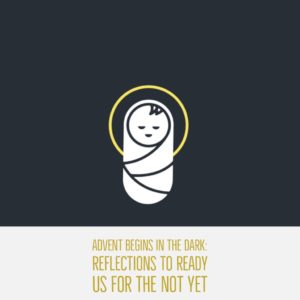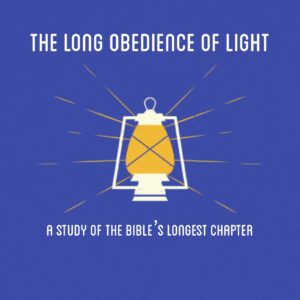Sermons
By Preacher
By Topic
By Book of Bible
By Series
Yes, Advent Begins In the Dark
Pastoral Prayer: Lord God, who through your Son revealed yourself as Light of the World, look at how dark it is still. We see glimpses of your light and at other times we contribute to the darkness. By your, Spirit help us to see the darkness we create. Yet, remind us of your faithfulness and that Your Son is faithful for us. Come again and set all things right . . . And all God’s people say . . . Amen.
Isaiah 64:1-12 (63:7-19)
Today marks the beginning of Advent. It marks the beginning of a New Year in the Christian Calendar. Advent also describes the time in between; the time in between Jesus’ first coming and his coming again. The time in which we live.
Fleming Rutledge, in an Advent sermon from 1996, remarked,
Advent teaches us to delay Christmas in order to experience it truly when it finally comes. Advent is designed to show that the meaning of Christmas is diminished to the vanishing point if we are not willing to take a fearless inventory of the darkness.
We slept at the south end of a long bedroom. On the opposite end was the closet. Though our books, toys, and clothes filled the closet to the point there was no room for anything else, once the lights went out I would imagine all sorts of monstrous things.
The dark was dark to me.
During the day those twin beds seemed too close, one bed was Paul’s the other one was mine. At night those beds were miles apart. Paul was in another zip code to me. Sometimes we had a night light. The small light seemed to make it worse at times. After all, whatever it was that would come from the closet should not be helped to see me by light. Dad and Mom slept just down the hallway. They were close enough to hear us laying awake talking or arguing. When it was dark and silent, they just as well be in another house.
Maybe my fear of the dark was little different than yours, if you were . . . or are. I have often wondered what it was that caused such fear. There are times I wonder if it was the enchanted way young people think. We have not yet come to the place where we have an explanation for everything. We have not yet claimed to know it all in word or deed. Our response is to attach an unseen cause for what we cannot explain. Ghosts. Monsters. Spooky things. All of them were hiding in our closet waiting to come out at night.
The pastor of my childhood spent the majority of his preaching and teaching time talking about the end of the world. Nothing spurs a child’s imagination quite like talking about Armageddon. Vivid imagery of Trumpets sounded, Bowls poured out and Seals being broken unleashing judgment on the world. Even though apocalyptic language does not function literally, what we heard emphasized literally connected then-current world events to soon coming terror. There was more often than not a constant connection between those fears and our future. Maybe that contributed to my fear of the dark.
Then there was the regular fear. It is the one that plagued me until I was headed for college, to be a preacher-boy. Though I did nothing felonious as a child, I had a litany of the normal things – I sassed Mother Mary, was taken in by curse words, stole a matchbox car from a cousin, ran into school teachers in the hallway – literally. Got mad at my brother and kicked in a screen door. Locked him in the mysterious closet until he broke out and broke the door frame. Faced with the prospect of the end of the world and the judgments I heard with regularity left me fearful for my future. Though I had trusted Jesus when I was nine years old, buried with Christ and raised to walk in a brand new life, it seemed I was always too alert to my failings, missing the mark.
During those nights when these thoughts afflicted me, I would tell God over and again that if I had used the wrong words when I trusted Jesus, had not been sincere enough, had not been sorry enough, I was now making up for that. It seemed never-ending.
By the time we get to the prophet Isaiah, Israel has had a long storied history with God, with Yahweh. Frankly, there was little progress in Israel’s life with God. Read the book of Judges or the Kings or the Chronicles. There is no linear plotline that has them getting better and better. Some are better, some aren’t. Our Text for today, the larger bit that begins in what we call chapter 63, recounts the faithfulness of God for a few verses, and then it is disrupted by these words,
But they rebelled and grieved his Holy Spirit.
At this point in their history, they had been ruled by the Assyrians and after a respite under King Hezekiah, they were on their way to becoming captives in Babylon. If we are measuring their experience by periods of light and darkness, light representing their faithfulness to God and darkness their unfaithfulness, the dark was dark to them. What’s more, they knew it. And, before we think we have done better, we should think again. Of all the people who should recognize darkness, it would be us. And when we do, do we get out in front of it like Isaiah?
Notice this in 63:7, the early part of the Song of Lament, of which our Text is a part,
I will make known the LORD’S faithful love and the LORD’s praiseworthy acts, because of all the LORD has done for us . . .
And then, after describing the history to which he is attached, that is Isaiah is connected to the community’s past, he includes himself in what was read earlier,
All of us have become like something unclean,
and all of our righteous acts are like a polluted garment;
all of us wither like a leaf,
and our iniquities carry us away like the wind.
Today we distance ourselves from the past from which we have come. In our own denomination, we often lay claim that we were not living when the SBC was formed by those who used the Scriptures to support slavery. We don’t like to consider that Southern Evangelicalism during Reconstruction, of which we are a part, influenced decisions such that racism went underground embedded in laws and social practices that linger to this day. Rather than follow Isaiah, who connected himself to the sins of his people’s past, we look to justify ourselves by distance.
Advent begins in the dark, Rutledge notes, for without taking a fearless inventory of the darkness, the Light of the world does not shine as bright. It does little good for us to decide there is no darkness in us, no darkness about us. A fearless look at the human predicament is not for snowflakes.
Don’t miss what Isaiah does. He takes up the place of the judged. I will make known the Lord’s faithfulness and all of us have become unclean.
I to us. The *them* of chapter 63 are his people living long before him. He draws a continuous line that illustrates,
All we like sheep have gone astray, each to his own way.
All of us. If we like the all in Christ died for all, then we must take in that all includes us in, But they rebelled. We don’t get to wash our own clothes, they are filthy.
When Isaiah takes up with the judged he points us toward what God will do in Christ, for us. Jesus will take the place of the judged. Too often we take up the place of the Judge. Pointing out what everyone else does so as to ignore what we have done. It is a terrible way to assuage guilt and to get rid of shame. Judging others guilty and shamed is not what Jesus comes to do. In fact, John the Baptist, the last prophet gives us Jesus’ own words,
For God did not send his son into the world to condemn the world, but to save the world through him.
The unnamed, unseen, mysterious Power is the Power of Sin waiting to take us captive again and again. It is the Power in the world that under the weight of the Law accuses us. Our breaking of that Law condemns us. We bear the guilt and shame. Try as we might to get out from under it by changing our laws, any laws leave us guilty and shamed.
Jesus came not to condemn us. We already were. He came to set us free.
We cannot deny the human situation is bleak. A man in Colorado killed his pregnant wife and two young daughters. He attempted to paper over the act suggesting the baby she carried was not his. While he plotted her death, his wife was planning a getaway for the two of them. Life expectancy is down in the United States due in part to the increased rate of suicide and increased deaths from the opioid epidemic. Scandals affect institutions whose message is one of love and care. Sure, you or I may not fall into any of these experiences but we need not be extreme illustrations to be captive to the Power of Sin.
Isaiah had not committed all the sins of his community. But, he placed himself as part of the judged, just as Jesus would. What would it mean for we who have been set free by the Judge, the one who took the place of the judged, were we to sit in the place for the judged? Rather than assuming ourselves the judge of others what if we sat in the dark for and with the judged? What a living illustration of the God who sees and God is present?
The Song of Lament implores God to Look! Here it is. In prayer, the community’s prayer, the command is for God to Look! It is no suggestion,
Look down from heaven and see from your lofty home – holy and beautiful. Where is your zeal and your might? Your yearning and compassion are withheld from me.
They dare lay claim to God’s promise with, Look! They up the accusation with Come Down! In their guilt and shame, they do not realize they are always seen and that God is always near. The absence they feel is tied to their unfaithfulness. Their accusation that God is somehow not seeing and not present papers over the contradiction that their status as a people was a direct result of God seeing and God being present.
All the way back at their origin story God’s spirit hovers over the face of the deep. The description clearly indicates God sees the disorder and does something about it. He sees. He comes down. He sees and is there.
Those dark nights when my imagination got the better part of me and I would think I was there all alone, I would whisper, “Paul, are you awake?” When he replied I would tell him, “I am afraid.” I would ask, “Could I sleep with you.” Just moments before I felt the distance between our twin beds to be miles apart. Recognizing he was right there brought security.
Israel had heard the warnings of the prophets. The words used by the prophets were often imaginative, vivid. Their response was to call out, Look at us! Come to us! Their confidence rested in the promise God made to them. Their accusation actually turned back on themselves. God had been faithful, the Song of Lament recounts the ways.
The answer to their darkness, the reality they had papered over in their sin, came through clearly in their own prayer. Despite their faithlessness, God remained faithful, it is expressed in their prayer this way,
Yet, you are our Father.
What was it this off-to-college-preacher-boy discovered? It was not that somehow he could explain away the ways the Power of Sin had not gotten the best of me, that I was not as bad as others. It was not that I learned to say the words with more accuracy, with more emotion, with more confidence. No, I learned the grace of God, God’s loving-kindness, did not grow out the degree of my sorrow or sincerity. Grace is the experienced reality of Divine Love. What God had done was just that, what God has done. And, what he has done he continues in Christ for me, for you, for us.
May our fearless inventory of the darkness make the longing for Christ’s coming again to rectify all things also be that which lead us to hear the Good News in the Angel’s announcement,
Fear not.


